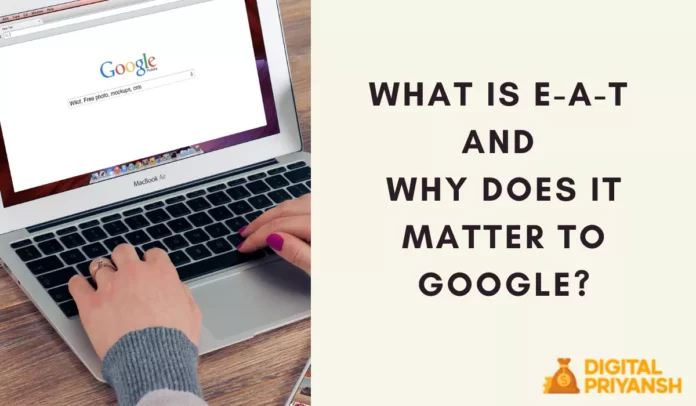In the ever-evolving world of search engine optimization, understanding the concept of E-A-T is not just a passing trend; it’s a fundamental pillar of Google’s search algorithm.
E-A-T plays an important role in determining how your website ranks in search results, and its significance has only grown in recent years.
In this article, we will delve into the intricacies of E-A-T and why it matters to Google.
By the end of this blogpost, you’ll have a clear grasp of how E-A-T can impact your website’s visibility and credibility, ultimately influencing your online success.
What Is E-A-T?
E-A-T, which stands for Expertise, Authoritativeness, and Trustworthiness, is a set of principles that Google uses to evaluate the value of content for users and assess its ranking potential.
The concept of E-A-T emerged in 2014, as Google incorporated it into their Search Quality Guidelines.
Google tasked its search quality evaluators with paying attention to specific criteria, including:
- The level of expertise possessed by the content creator.
- The authoritativeness of the content creator, the content itself, and the hosting website.
- The trustworthiness exhibited by the content creator, the content, and the website.
In essence, E-A-T serves as an indicator of high-quality content, making it more beneficial for users.
How Is EAT Evaluated?
Here is how E-A-T is evaluated:
1. Expertise.
Expertise is a fundamental aspect of content evaluation.
It pertains to the qualifications, knowledge, and experience of the author or source.
When considering the expertise of an author or organization, it’s important to delve into their background, education, portfolio, and experience.
For instance, an article on medical advice holds more weight and trustworthiness if it’s authored by a qualified healthcare professional.
Expertise ensures that the information is based on sound knowledge and experience.
2. Authoritativeness.
Authoritativeness, the second pillar of EAT, is equally critical.
Authoritativeness is all about the reputation and influence of the source.
The credibility of a source is inextricably bound to its reputation, the enduring legacy it has forged, and the degree of recognition it commands within the relevant domain.
Well-established, reputable organizations or individuals are often considered more authoritative.
Scholarly journals, government agencies, and renowned experts in their respective fields are typically seen as authoritative sources.
Their credibility adds weight to the information they provide.
3. Trustworthiness.
Trustworthiness, the final aspect of EAT, is an equally critical dimension of content evaluation.
Trustworthy sources are invariably characterized by transparency, where their methodology, sources of information, and any potential conflicts of interest are openly disclosed.
Furthermore, such sources diligently provide citations, references, and attributions for their claims, thereby facilitating independent verification.
Additionally, they present information objectively and devoid of bias or emotional manipulation, ensuring that their content adheres to a stringent standard of impartiality.
Trustworthiness ensures that the information can be relied upon and is presented without hidden agendas or misleading intentions.
Is E-A-T A Ranking Factor?
No, technically speaking, E-A-T is not considered a direct ranking factor; however, it can indirectly influence the ranking of your content.
This situation can be somewhat perplexing, akin to the enigma of Burger King’s Whopperito.
E-A-T is a set of guidelines that Google employs to assess content quality and its potential to rank higher in search results.
While it may not directly determine rankings, it does impact your overall search position indirectly.
Nevertheless, the significance of E-A-T may not be as pronounced as some SEO professionals had initially perceived.
Gary Illyes, a representative from Google, has indicated that the excessive attention given to E-A-T is somewhat exaggerated and is seldom a topic of internal discussion.
Why Is E-A-T Important For SEO?
Have you ever encountered the phrases “content is king” or “create high-quality content” in the context of SEO discussions?
I’m sure you have. SEO professionals have been emphasizing these concepts repeatedly.
However, these phrases often fail to provide clear guidance on what actually constitutes high-quality content.
Is it about using more images, longer-form content, extensive use of alt tags, or optimizing meta descriptions?
The answers remain elusive.
Now, Google has offered a glimpse into what defines high-quality content, a revelation with profound implications for content marketing and SEO professionals.
The E-A-T guidelines serve as a reference for human reviewers who evaluate numerous websites, outlining precisely what Google considers high-quality content.
According to these guidelines, exemplary content should:
- Serve the needs of users.
- Originate from an expert in the field.
- Be hosted on an authoritative website.
- Be reliable and dependable.
- Undergo regular updates.
Ideally, the content should be crafted by individuals with a high degree of expertise.
Nevertheless, “everyday expertise” from individuals with practical experience can suffice where appropriate.
Pages that promote hate, cause harm, misinform, or deceive users may receive a lower E-A-T rating from the evaluators tasked with assessing search results.
Checklist To Improve Your Website’s E-A-T.
Now that you’re well aware that E-A-T isn’t about your mom’s famous lasagna, but rather a critical aspect of Google’s algorithm, you understand why it’s creating a buzz among SEO professionals.
But what does it mean for your website?
It signifies the need to elevate the quality of your content.
Here’s a seven-step checklist to help your website become more authoritative and trustworthy:
1. Tell Visitors Who You Are.
All components of E-A-T guidelines emphasize the importance of attributing content to legitimate sources.
If you don’t already have an “About Us” or “Team” page outlining your team members and content creators, it’s high time you create one.
Author pages are a simple yet effective way to demonstrate your team’s expertise, authority, and trustworthiness.
2. Work With Subject Matter Experts To Create Content.
Google doesn’t just demand good content; it requires content from individuals who possess deep knowledge of their subject matter.
Instead of hiring ghostwriters to churn out subpar content on high-traffic keywords, consider partnering with experts in your field to create content that Google can trust.
This could involve interviewing a scientist, inviting experts for guest posts, or partnering with reputable organizations to publish top-tier research.
3. Clarify The Purpose Of Your Content.
Every piece of content should have a clear objective and purpose.
Are you aiming to inform, explain, persuade, or describe?
Use titles and headings that unequivocally convey your content’s purpose and employ straightforward language.
For instance, this article utilizes question-based headings to assure you’ll find all the answers you seek about E-A-T.
Avoid lengthy, meandering content, and get straight to the point while covering the topic comprehensively.
4. Keep Your Content Updated.
In the digital age, we generate a vast amount of data daily.
By 2025, we’re expected to produce an astonishing 463 billion gigabytes of data each day.
Consequently, content becomes outdated rapidly.
Software updates, websites go offline, personnel take on new roles, and Google tweaks its algorithms frequently.
In my experience, online content typically has a lifespan of about two years, contingent on the subject and industry.
Ensure your content remains accurate and up to date by incorporating content updates into your SEO strategy.
Regularly update statistics, adhere to best practices, and check for broken links, particularly in high-ranking content.
5. Link To High-Quality Sources.
To establish yourself as an expert, substantiate your claims with credible data.
Link to authoritative sources, official studies, and research papers to support your assertions and demonstrate your expertise.
Utilize trusted sources like the National Center for Biotechnology Information (NCBI) and the Journal Storage (JSTOR) to find relevant studies.
You can also link to tweets, papers, or reports authored by industry professionals.
6. Consider Multiple Viewpoints.
For content to be considered trustworthy, it should explore issues from various angles and analyze each perspective’s contributions to the overall discussion.
For instance, if your content revolves around the best types of ice cream, it’s evident that one type won’t suit everyone.
Some individuals may prefer ice cream made with locally sourced ingredients, while others might struggle to choose between ice cream and a cocktail, leading them to opt for quirky flavors like BBQ ice cream.
The goal is to elucidate diverse viewpoints on a topic to establish trust with your audience and showcase your expertise.
7. Monitor Your Online Reputation.
Your online reputation significantly influences your website’s trustworthiness and the reception of your content.
Safeguard your brand’s reputation by promptly addressing negative press and unfavorable reviews.
Ensure that you claim all your social profiles under your brand name to prevent others from taking control.
Encourage satisfied customers to leave positive reviews about your brand.
While it’s not necessary to go to great lengths to build an enormous brand if it doesn’t align with your business goals, but do take measures to preserve your good name and reputation.
Conclusion.
As the SEO landscape continues to evolve, understanding and optimizing for E-A-T is no longer an option but a necessity for anyone striving to establish a prominent online presence.
Google’s emphasis on E-A-T (Expertise, Authoritativeness, and Trustworthiness) underscores the importance of delivering high-quality, reliable content to users.
By adhering to these principles, you not only enhance your website’s ranking in search results but also contribute to a more trustworthy and informative internet ecosystem.
To stay ahead in the competitive world of SEO, prioritize E-A-T in your content creation and website management strategies, and watch your online presence flourish as a result.







